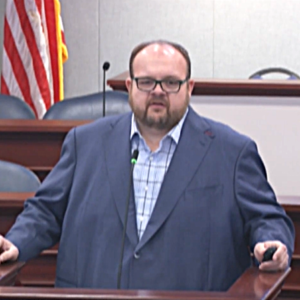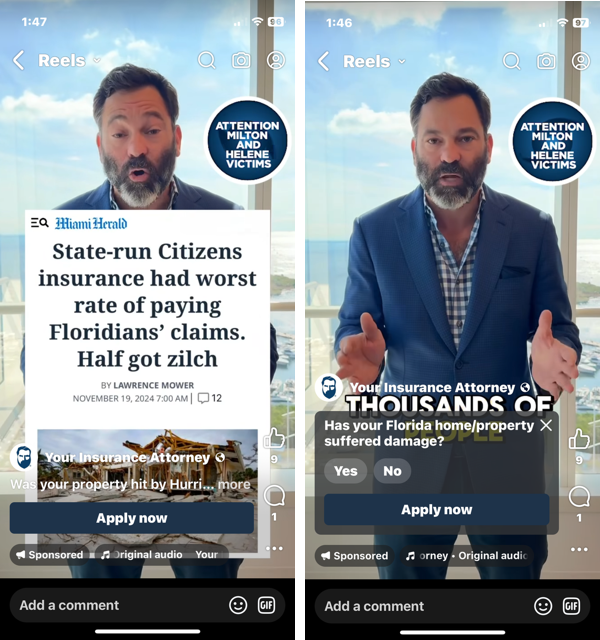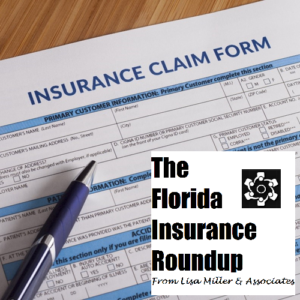Florida Insurance Commissioner Michael Yaworsky is asking the state legislature to hold-off on any further property insurance reforms as the head of Citizens Property Insurance warns of an effort to roll-back consumer property insurance reforms in the upcoming 2025 legislative session.
Deputy Insurance Commissioner Virginia Christy told an audience at the Florida Chamber Insurance Summit earlier this month that the 2022 & 2023 legislative reforms have strengthened the marketplace by reducing litigation, which has helped ease rate increases and returned insurance companies to profitability, but that Yaworsky wants more time to analyze the effects of those reforms. “Until that data comes through, we don’t want to have any other tweaks that would set us back from this path that we’re on, which is a good path to reform,” said Christy.

Florida Insurance Commissioner Michael Yaworsky addressing legislators, December 3, 2024. Courtesy, The Florida Channel
Litigation was one of the issues that Yaworsky directly addressed at a training session for newly-elected legislators earlier this month. He said that 2022/2023 was the first year of OIR’s Property Claims Lifecycle Report (PCLR) data call, which provides “a line-by-line breakout of exactly what happened to every single property claim in a given calendar year.” The previous data set used delivered the familiar statistic that Florida had 8% of all property claims in the country yet 76% of all property claim litigation, he said. OIR has since been able, using the PCLR data, to break that number down within the state.
“The statewide average litigation rate among all property insurance claims is 9.8% and when you take out the metro areas, it’s about 5%,” Yaworsky told legislators. The Tri-County area of South Florida saw 27.5% of its claims were litigated. Miami-Dade by itself had more than one in three claims litigated, “which is an area of the state that had not been impacted by storm in over a decade,” Yaworsky noted.
He told the new legislators that Florida had been the only state with the one-way attorney fee statute (for plaintiff attorneys). “Now we’re in a state where we’re like 49 other states that have a contingency based structure that really encourages rationality in the space.” Yaworsky shared that the Loss Adjustment Expense for a litigated claim “costs five times higher than it does for a non-litigated claim.” He said he’s had conversations with just about every insurance company CEO on the need to communicate with customers so they don’t “escalate (the claim) up to litigation or public adjuster… that adds a lot of costs.”
“You can cut all that off as a company, or a lot of it off, if you’re just out in front of your customers and making sure that they know and feel like you’re paying attention to their needs. And so we’re seeing generally good results on that and we’ll have more data as time goes on.” Yaworsky told legislators.
Citizens Property Insurance President & CEO Tim Cerio, responding to recent news stories on its number of closed claims without payments, warned that forces are at work in the upcoming 2025 to roll back the 2022/2023 legislative reforms. He pointed to “the cottage industry of lawyers, teamed up with contractors, teamed up with public adjusters, who engage in fraudulent behavior and inflate claims,” in remarks before the Citizens Board of Governors.
It’s no coincidence that those floating these questions on closed claims – and the associated innuendo that the Florida property insurance industry is ripping-off its customers – are those associated with or are members of the trial bar in Florida. Some are even using the news stories in their advertisements to prospective clients (below). This is all happening just weeks before the first committees of the new Florida Legislature meet in January in preparation for the March 2025 session.

Screenshots of a recent Facebook advertisement by South Florida plaintiff attorney Anthony Lopez soliciting business
 I tackled this issue on our latest episode of The Florida Insurance Roundup podcast. We explored the accusations by Martin Weiss of Weiss Ratings that Florida’s property insurance companies, including Citizens Insurance, are deliberately paying only half their claims and “in a state of collapse.” To the contrary, Locke Burt of Security First Insurance provided the newest market information from mid-November showing a number of Florida companies are now making money. He also questioned Weiss’ methodology and claims, which are now the subject of an investigation by the Florida Office of Insurance Regulation.
I tackled this issue on our latest episode of The Florida Insurance Roundup podcast. We explored the accusations by Martin Weiss of Weiss Ratings that Florida’s property insurance companies, including Citizens Insurance, are deliberately paying only half their claims and “in a state of collapse.” To the contrary, Locke Burt of Security First Insurance provided the newest market information from mid-November showing a number of Florida companies are now making money. He also questioned Weiss’ methodology and claims, which are now the subject of an investigation by the Florida Office of Insurance Regulation.
Commissioner Yaworsky shared the chart below on the industry’s performance, showing property insurance companies losing money between 2017-2022. “And then post reform, we start to see a resiliency,” he noted. “Rates had caught up to the needs in that space and you see them beginning to turn around and make a modest amount of money. When I say they’re making money, that doesn’t mean that they’re sending that up to dividends. Generally, that is just profit that now exists in the company. A lot of it is going to reserving. A lot of is going to do other things, not just take-home pay that they’re allowed to automatically pull out of the company,” said Yaworsky.

Source: Florida Office of Insurance Regulation
Yaworsky also talked about the downward trend in homeowners insurance rates and the “ramped up enforcement” of companies under the same legislative reforms. “Nearly $2.8 million in fines were issued between January and October, a staggering increase from $233,000 during all of 2023, according to the latest enforcement report,” the Tampa Bay Business Journal reported. He verified “the actual real number… the true, simple average cost” of a homeowners insurance policy in Florida is $3,731. His presentation contains other good charts, including the composition of property insurance rates. While reinsurance, on average, is 30% of the rate, Yaworsky said “the number can be as high as 45% to 50% to 60% of your premium dollars going to reinsurance for catastrophes.”
So far, only a few bills relating to property insurance have been filed for the upcoming session, most of them regarding increased storm resilience. I’ll take a look at the latest bills filed in our January blog and the LMA Newsletter.

